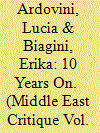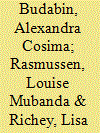| Srl | Item |
| 1 |
ID:
181815


|
|
|
|
|
| Summary/Abstract |
Although the popular protests that swept across the Middle East and North Africa in 2011 were short-lived, their long-term consequences are still resonating through the region a decade after their outbreak. Islamist movements have been affected in different ways by the drastic change in the political, social and geographical contexts in which they historically operated, highlighting the need for a renewed examination of these changed circumstances. Based on the case study of the Egyptian Muslim Brotherhood, we argue that three key factors need to be accounted for when studying Islamist movements in the aftermath of the 2011 uprisings. These are the dimension of exile; the increased role played by women and youth; and the emergence of cross-generational and cross-ideological alliances. The article analyzes these three factors through a comparative study of responses by Muslim Brotherhood and Muslim Sisterhood members to repression across Egypt, Turkey and the UK.
|
|
|
|
|
|
|
|
|
|
|
|
|
|
|
|
| 2 |
ID:
154471


|
|
|
|
|
| Summary/Abstract |
The past decade has seen a frontier open up in international development engagement with the entrance of new actors such as celebrity-led organisations. We explore how such organisations earn legitimacy with a focus on Madonna’s Raising Malawi and Ben Affleck’s Eastern Congo Initiative. The study draws from organisational materials, interviews, mainstream news coverage, and the texts of the celebrities themselves to investigate the construction of authenticity, credibility, and accountability. We find these organisations earn legitimacy and flourish rapidly amid supportive elite networks for funding, endorsements, and expertise. We argue that the ways in which celebrity-led organisations establish themselves as legitimate development actors illustrate broader dynamics of the machinery of development.
|
|
|
|
|
|
|
|
|
|
|
|
|
|
|
|
| 3 |
ID:
142853


|
|
|
|
|
| Summary/Abstract |
New ideas and new actors are needed to fill the void in the region’s public sphere more than ever.” Fourth in a series on public spheres around the world.
|
|
|
|
|
|
|
|
|
|
|
|
|
|
|
|
| 4 |
ID:
121876


|
|
|
|
|
| Publication |
2013.
|
| Summary/Abstract |
Contemporary maritime security threats such as piracy, smuggling and illegal fishing are major concerns in Southeast Asia. responding to these threats have long been seen as the responsibility of governments. This article demonstrates how new actors have become involved in addressing national and regional maritime security threats in Southeast Asia. Focussing on three distinct types of new actors - for-profit actors, not-for-profit actors and multilateral institutions - the article provides an understanding of the (sometimes controversial) nature of their responses to threats and the relationships between these new actors and the state. By revealing the contribution made by new actors in Southeast Asia - a region where governments are particularly protective of their sovereignty - this article shows how and why established patterns of security governance in Southeast Asia are changing and offers new insights into alternative methods for tackling maritime security threats.
|
|
|
|
|
|
|
|
|
|
|
|
|
|
|
|